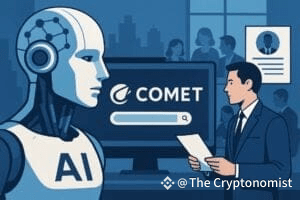
The world of work is undergoing an unprecedented transformation, driven by the rapid rise of artificial intelligence.
Sounding the alarm is Aravind Srinivas, CEO of Perplexity AI, who in a recent interview on The Verge’s Decoder podcast outlined a clear scenario: some professions, particularly that of recruiters, could disappear within just six months.
According to Srinivas, the change is no longer just about the automation of small tasks, but the complete management of entire workflows by intelligent agents.
At the center of this revolution is Comet, the new AI browser developed by Perplexity, which promises to redefine the very concept of office work.
The advance of AI in relation to the world of work according to Aravind Srinivas
It is not just an enhanced search engine.
Comet is described by Srinivas as a true artificial intelligence agent, capable of receiving instructions, processing complex information, and completing tasks from start to finish, without any human intervention.
The most striking example concerns the human resources sector. Traditionally, the work of recruiters is based on activities such as candidate search, information gathering, direct contact, and interview scheduling.
Tasks that, according to Srinivas, can be performed more quickly and efficiently by AI.
Srinivas does not mince words: “The work of a recruiter that is worth a week is just a starting point.” The reference is to Comet’s ability to automate the entire personnel selection process.
The system, for example, can identify Stanford engineers who have worked at the best artificial intelligence companies, gather their LinkedIn profiles, acquire contact details, and even send personalized emails, all without any human input.
This automation is not limited to simple research: Comet is capable of managing communication, organizing interviews, and overseeing every phase of the selection process, drastically reducing time and costs.
According to the CEO of Perplexity, recruiters will be the first to experience the impact of this revolution, with the real possibility that their profession will be completely replaced by AI within six months.
The effectiveness of Comet is not limited to the recruiting sector. Even executive assistants might soon see their role challenged.
The AI browser by Perplexity can indeed access services like Gmail and Google Calendar (with user authorization), manage appointment scheduling, track emails, resolve calendar conflicts, and even prepare detailed summaries before meetings.
A new work paradigm: humans dictate, AI executes
These functionalities allow the delegation of a wide range of daily activities to AI, freeing up valuable time for more strategic tasks.
However, the question that naturally arises is whether this efficiency will lead to greater productivity or if it will mark the beginning of a massive loss of jobs.
According to Srinivas, the way of working is changing radically. Humans will no longer be required to perform repetitive or organizational tasks: it will be enough to communicate the desired result to the AI, and the intelligent system will take care of everything else.
This perspective opens up new scenarios: on one hand, the possibility of increasing productivity and focusing energies on activities with higher added value; on the other hand, the concrete risk of seeing entire professional sectors disappear or drastically reduce.
The revolution brought by artificial intelligence is now unstoppable, but the question of its social impact remains open.
On one hand, tools like Comet promise to simplify work life and increase efficiency, but on the other hand, they raise questions about the future of employment.
Srinivas is confident in the potential of AI, but does not hide that recruiters have their days numbered. His prediction is clear: within six months, artificial intelligence will take control of the desks of those who are currently involved in personnel selection.
A look to the future: adapt or disappear
The message from the CEO of Perplexity is unequivocal: the world of work is changing, and those who cannot adapt risk being left behind.
The challenge will be to find new roles and skills that can coexist with AI, leveraging its potential without being overwhelmed by it.
For now, the certainty is that tools like Comet are already redefining the rules of the game, paving the way for a future in which the collaboration between man and machine will be increasingly close, but also more competitive.

